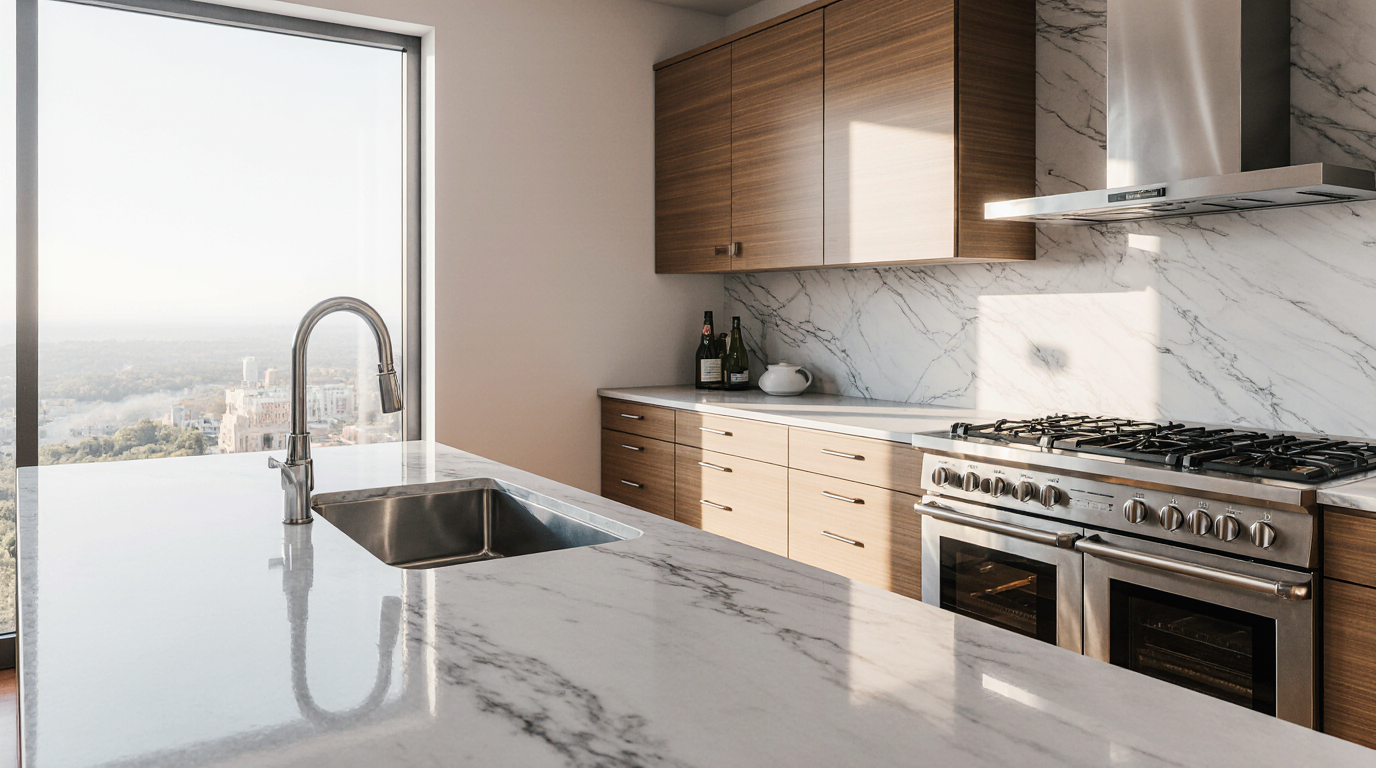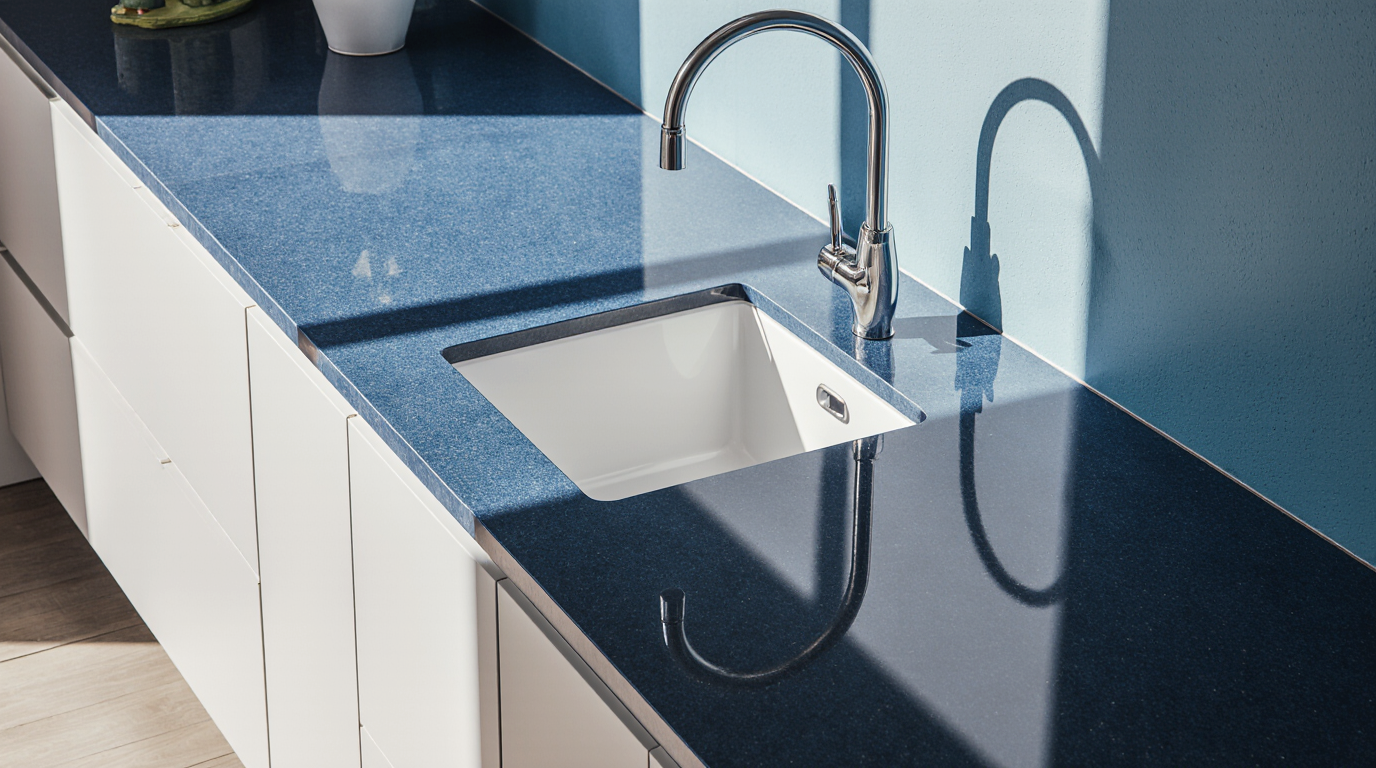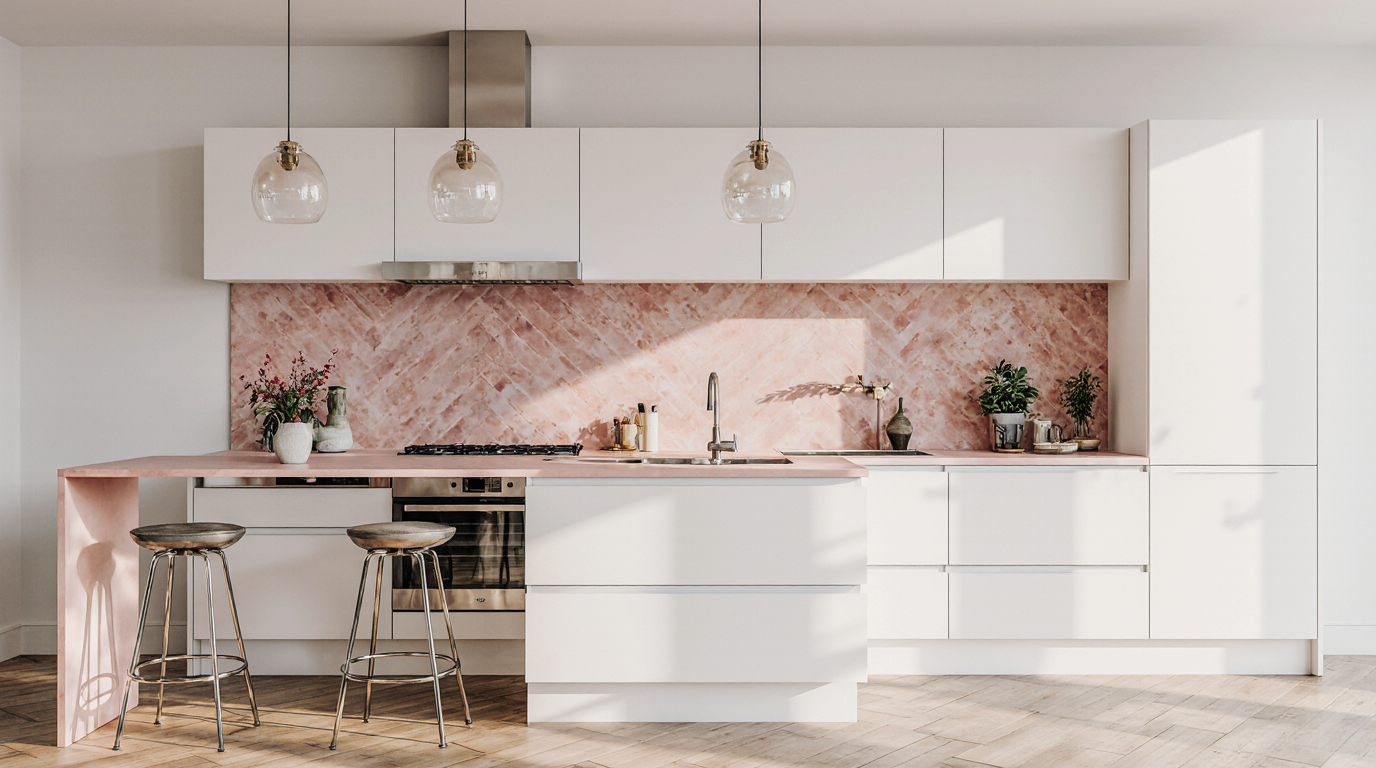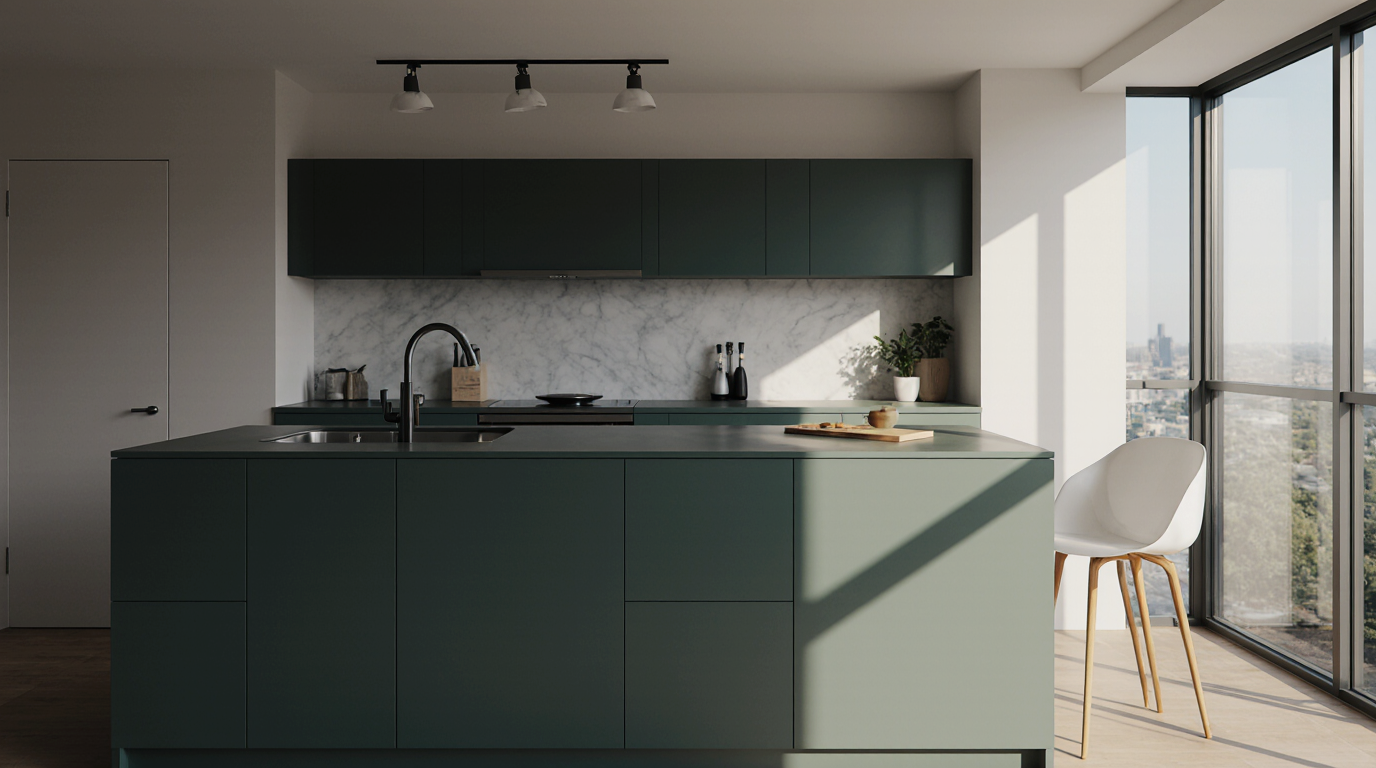Different Types of Countertops
Exploring the wide range of countertops reveals countless options for transforming your kitchen into a environment that combines elegance, longevity, and functionality. Each material brings its own character, texture, and benefits, making the decision on the material one of the most defining decisions in kitchen design. Ranging from high-end marble to contemporary engineered slabs, modern kitchens offer boundless selections to suit their lifestyle and aesthetic preferences.
Exploring the wide range of countertops reveals countless options for transforming your kitchen into a environment that combines elegance, longevity, and functionality. Each material brings its own character, texture, and benefits, making the decision on the material one of the most defining decisions in kitchen design. Ranging from high-end marble to contemporary engineered slabs, modern kitchens offer boundless selections to suit their lifestyle and aesthetic preferences.
Granite remains a preferred option for its signature textures and resilient composition. Each slab of granite is unique, showcasing natural veining and colors that enhance kitchen elegance. Granite’s ability to withstand heat, cuts, and daily wear ensures a durable and stylish solution. Engineered quartz delivers a flawless, durable surface, mimicking natural stones while offering ease of care and consistent coloring.
Customizable concrete countertops are a bold choice for modern kitchen aesthetics and industrial vibes. Malleable and versatile, concrete surfaces adapt to individual style needs, making each countertop a distinctive design element. Exquisite marble counters convey luxury and visual grandeur, perfect for classical interiors, but demand attentive upkeep. Butcher block counters combine rustic charm with functional design, creating a homely feel while remaining suitable for everyday cooking tasks when treated correctly. Ultimately, the best countertop material depends on balancing functionality, budget, and aesthetic goals. From luxurious marble to resilient granite or sophisticated quartz, each choice can transform the kitchen experience and enhance daily life.
types of quartz countertops
Quartz countertops are celebrated for their durability and minimal care, but their aesthetic range is truly exceptional. Unlike natural stone, engineered quartz can be designed into a vast array of styles. You'll find options that closely resemble natural marble, showcasing dramatic, flowing veins (such as Calacatta or Statuario styles). Other types feature subtle granular patterns for a more even, contemporary look, often seen in minimalist kitchens. Solid color quartz, from soft ivory to dark onyx shades, offers a sleek aesthetic. There are even varieties that include metallic flecks for a sparkling finish. This engineered consistency means the sample you see in the showroom is exactly what you'll get installed in your home.
types of granite countertops
Granite remains a preferred option for its organic elegance. Each slab is unique, a piece of art formed by nature. Generally, granite is categorized by "tiers" (Level 1, 2, 3+), which indicate rarity, origin, and the intricacy of its veining, often influencing price. Common color families include consistent, speckled options like Uba Tuba (dark green/black) or New Caledonia (gray/brown), which are often budget-friendly. Mid-range granites might include popular whites and grays with more movement and distinct mineral inclusions. High-end, "exotic" granites boast dramatic, sweeping veins and unusual hues, making them a focal point of any kitchen.
types of stone countertops
When exploring stone countertops, you have a wealth of options, each with specific qualities. Natural stone includes evergreen favorites like granite, valued for longevity and distinctive veining. Marble offers classic sophistication with its soft, veined appearance, though it demands attention as it's fragile and absorbent. Quartzite is a metamorphic rock that's highly resilient and often resembles marble but is much tougher and etch-proof. Soapstone provides a soft, earthy appearance that develops a patina over time. On the engineered side, quartz is the dominant player, blending quartz particles and binders to create a non-porous, highly resilient, and customizable surface.
different countertop materials
The world of countertop materials offers more than natural stone, offering solutions for diverse needs and designs. Laminate countertops are a affordable solution, offering a wide spectrum of designs that can replicate natural materials, though they are less durable and heat-resistant. Solid surface materials (like Corian) are smooth, repairable, and resistant to stains, offering a soft, matte finish. Wood or butcher block countertops bring organic charm and are ideal for kitchen tasks, but they require regular oiling and sealing. For an industrial or commercial look, stainless steel is hygienic, heat-proof, and durable. Concrete countertops are custom-poured and can be finished in various ways for a distinctive, contemporary, or earthy look.
different types of kitchen countertops
Choosing the right kitchen countertop depends largely on your habits and care preferences. Low-maintenance champions include engineered quartz and solid surface materials, which are non-porous, stain-resistant, and never require sealing. Laminate is also low-effort to upkeep but can be scratched or scorched easily. Natural stones vary widely. Granite is highly durable but, as a semi-porous material, typically needs sealing every one to two years to resist stains. Marble is the most demanding; it's soft, etches easily with acids (like lemon juice), and stains, requiring diligent sealing and immediate cleanup. Wood butcher block needs regular oiling to prevent drying, cracking, and bacterial growth.
types of marble countertops
Marble countertops are the pinnacle of luxury, defined by their soft texture and graceful veining. The most famous types come from Italian quarries and are differentiated by their base hue and vein structure. Carrara marble is widely popular and affordable, featuring a pale white surface accented with gentle gray lines. Calacatta (or Calacatta Gold) is rarer and more dramatic; it has a light base and pronounced gray-to-gold patterns. Statuario is another coveted white marble, similar to Calacatta but with thinner, sharper dark gray veins. Additionally, you can explore marbles in striking hues, such as the luxurious green of Verde Alpi or the dramatic black of Nero Marquina.
different kinds of countertops
When assessing different kinds of countertops, durability and resistance to heat are key. Granite and quartzite are highly durable natural stones, ideal for hot pans and daily wear; you can often set hot pans without worry (though protective mats are preferred). Engineered quartz is also highly scratch- and stain-resistant, thanks to its sealed structure, but its binders can warp under extreme heat. Solid surface is more delicate but repairable, although surface blemishes can often be repaired. Laminate is the least durable option, easily scratched, scorched, or delaminated. Stainless steel is virtually indestructible and heat-proof, though it may show fingerprints and scratches.
different countertops
Different countertops can transform the look of your home. For a clean, contemporary, or stylish vibe, white quartz, stainless steel, or light concrete creates a refined and sharp aesthetic. For a cozy, classic, or countryside-inspired look, butcher block and aged soapstone adds warmth, texture, and character. Natural granite, with its irregular patterns and earthy colors, complements a variety of kitchen themes. Marble, with its soft veining, is perfect for a luxurious, classic look. Recycled glass or vivid laminates can add a fun, artistic, or vintage touch.
kinds of countertops
Countertops are commonly classified as natural or man-made. Natural countertops are sourced directly from natural stone. This group includes granite, marble, quartzite, and soapstone. Their key advantage is unmatched natural uniqueness, as no two slabs are alike. However, they are absorbent and require care and require periodic maintenance to stay pristine. Engineered countertops are crafted for consistency and durability. This category is dominated by quartz, which is a high-percentage quartz blend enhanced with resins and colorants. Other engineered options include solid surface, laminate, and recycled glass. Their key strength is resilience and low maintenance.
different types of quartz countertops
Beyond color and pattern, different types of quartz countertops are recognized for the type of finish applied. The most common is polished, giving a glossy, reflective shine. A honed finish is matte and smooth, perfect for understated, sleek interiors, but is prone to showing slight imperfections. A "sueded" or "leathered" finish offers a brushed effect that hides imperfections, great for hiding smudges, and provides texture and visual interest.
types of countertops by price
Understanding the types of countertops by price can help narrow your choices significantly. Laminate sits at the budget-friendly spectrum, providing affordable style and versatility, alongside simple ceramic tile options. In the mid-range, you'll find butcher block, solid surface, and entry-level granites (often Level 1). Durability and sophistication notably improve in this range over laminate. High-end choices feature engineered quartz, superior granite and quartzite slabs, as well as bespoke concrete. Luxury countertops include rare and exotic granites, exclusive marbles such as Calacatta, and unique surfaces like lava stone, zinc, and thick custom stainless steel.
types of kitchen countertops by price
Assessing kitchen countertops based on price involves both material and additional cost factors. Labor for fabrication and installation heavily affects the final price. Factors include the total square footage needed, the complexity of the job (number of seams and corners), and the type of sink (a simple drop-in vs. a more complex undermount). The edge profile you choose also impacts the price; a simple, squared-off "eased" edge is standard and included. More elaborate ogee, bullnose, or waterfall edges require more fabrication and cost extra. Stone slab quality and uniqueness, especially in granite and marble, can significantly shift final costs.
types of kitchen counter tops
Examining the top three kitchen countertop choices—laminate, granite, and quartz—highlights their key features. Laminate stands out as the most economical option. Laminate offers effortless installation, endless design possibilities, and low maintenance. Yet laminate is vulnerable to heat, scratches, and water damage if seams are compromised. Granite is the classic natural choice, prized for its unique beauty and excellent heat resistance. Granite’s downside is porosity, requiring regular sealing to avoid stains. Engineered Quartz is the modern favorite, offering the look of stone with zero maintenance. Quartz resists stains, does not absorb liquids, and is extremely durable. The primary limitation is that extreme heat may damage quartz more than granite.
kitchen counter top types
While stone and laminate dominate, several other kitchen counter top types offer unique aesthetics and functionality. Stainless steel remains popular in commercial kitchens due to hygiene, heat resistance, and robustness. It creates a sleek, industrial vibe but is prone to scratches and visible fingerprints. Recycled glass countertops combine sustainability with colorful, terrazzo-inspired designs in resin or cement. Paper composite surfaces, made from paper and resin, offer warmth, softness, and durability that improves with age. Premium lava stone countertops feature glazed surfaces that are non-porous, stain-resistant, and visually dramatic.
different stone countertops
Various stone countertops differ greatly in durability, maintenance, and performance. Quartzite and granite are the hardest, most durable natural options, highly resistant to scratches and etching from acids. Softer marble is vulnerable to acid etching, which dulls its surface. Soapstone is also relatively soft and can scratch, but these scratches are part of its rustic charm and can be oiled or lightly sanded out. Sealing granite and marble regularly prevents staining because of their porous nature. Even with lower porosity, quartzite gains from occasional sealing. Soapstone is naturally non-porous and doesn't need a sealer, though mineral oil is used to darken its patina.
kinds of quartz countertops
When exploring types of quartz countertops, options typically divide into two broad categories: quartz resembling natural stone and uniform, man-made designs. The marble-inspired quartz is widely favored, featuring flowing, marble-like patterns (from delicate to striking) on a pale backdrop. These offer the high-end beauty of marble without the high maintenance. The other type includes more consistent patterns. This can be one consistent hue (such as white, gray, or black) for a minimalist design. It also includes subtle speckling or textured finishes that create a balanced surface, ideal for modern kitchens avoiding visual clutter.
different kinds of kitchen countertops
The best kitchen countertop for you is determined by your habits and cooking needs. For a family that cooks frequently, resilience and easy cleaning are essential. Quartz and mid-tone granite work best as they are durable, low-maintenance, and kid-friendly. Baking enthusiasts often choose marble or stainless; marble provides a cool surface perfect for dough, while stainless steel is seamless and hygienic. If you want a warm, inviting space and enjoy cooking, butcher block countertops combine aesthetics with utility, but it needs routine care.
types of stone for kitchen countertops
The "stone" category for kitchen countertops is split into two primary types: man-made quartz and natural stone. Natural stone is sourced from natural rock formations. The commonly used stones include granite, marble, and quartzite, all prized for beauty and strength. Each slab of natural stone is unique, but they all require periodic sealing to remain stain-resistant. Engineered stone, mainly quartz, is synthetic, uses crushed quartz and binders to create a consistent surface. This process produces uniform, hard-wearing, and low-maintenance countertops.
different countertop types
For eco-conscious homeowners, several varieties of surfaces are considered eco-friendly. Sustainably sourced wood blocks combine aesthetics, functionality, and renewability. Countertops using recycled glass create vibrant, sustainable surfaces. Surfaces from recycled paper and green resins provide durability and visual warmth. Even concrete countertops can be eco-conscious if using recycled content and low-VOC finishes.
kinds of countertops for kitchens
When selecting varieties of countertops for kitchens, hygiene and functionality are just as important as aesthetics. Non-porous surfaces are the most hygienic because they prevent bacteria, mold, and liquids from penetrating. Engineered quartz, solid surface, and stainless steel are the top performers in this category. They are seamless (or have very inconspicuous seams) and can be cleaned and disinfected easily. Stone and wood need sealing to prevent stains and bacteria. Laminate is non-porous on its surface, but its seams and particle board substrate can be vulnerable to water damage, which can harbor bacterial growth if compromised.
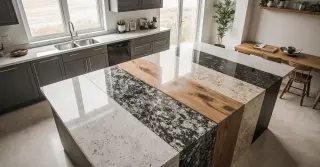
Ultimate Guide to Countertop Options for Modern Kitchens and Interiors
When it comes to designing a kitchen or bathroom, selecting the ideal countertop is one of the most crucial choices that impacts both design appeal and everyday utility. Countertops serve as essential surfaces for daily tasks but also set the tone for interior design, influencing the aesthetic cohesion and atmosphere. From luxurious traditional stones to cutting-edge surfaces like concrete and quartz, the variety of countertops available today allows homeowners to tailor their choices to personal taste and lifestyle requirements, ensuring a combination of functionality and style.
Natural stone countertops embody timeless elegance and high-end appeal in upscale kitchen and bathroom designs. Granite, for example, is renowned for its strength, distinctive patterns, and longevity, perfect for everyday culinary use. Every slab offers a unique pattern, ensuring no two countertops are identical, infusing an element of sophistication into any interior. Marble, conversely, offers luxurious, enduring beauty. Although slightly more delicate than granite, marble enhances elegance with its classic appeal, while its natural cooling properties make it ideal for baking and culinary tasks.
Quartz countertops are increasingly favored for their durability and aesthetic versatility. Unlike traditional natural stones, engineered quartz combines natural minerals with synthetic resin for consistency, reducing absorption and improving hygiene. This ensures exceptional durability and easy cleaning, ideal for modern households prioritizing both aesthetics and functionality. Quartz also enables homeowners to select from subtle to eye-catching palettes, providing aesthetic freedom alongside long-lasting performance.
Concrete countertops appeal to enthusiasts of contemporary, industrial-inspired interiors. These countertops allow for bespoke customization in texture and tone. Concrete surfaces accommodate a wide range of creative applications, achieving bold, industrial-chic aesthetics. Although care involves sealing to ensure long-term performance, concrete endures high traffic while maintaining style.
Wood countertops add warmth and an organic, inviting feel to interiors. Butcher block surfaces made from durable woods including oak, maple, and walnut combine practicality with aesthetic charm, highlighting natural textures that enhance design. Maintenance is crucial, as regular conditioning preserves both appearance and integrity. Wood blends with diverse interior styles from contemporary to traditional.
Laminate countertops offer affordability alongside modern aesthetics. Modern laminate replicates natural materials with high visual fidelity, providing easy cleaning, lightweight installation, and stain resistance. Despite cost-effectiveness does not limit creative possibilities, offering wide-ranging design opportunities within budget constraints.
Recycled countertops represent eco-conscious design choices that are visually striking. Recycled glass surfaces produce decorative, high-performance surfaces from recycled content, offering resilience and a visually dynamic effect. Beyond glass, other recycled options include diverse natural or repurposed elements, appealing to homeowners who want style and sustainability in one.
Solid surface countertops, such as engineered composite materials, offer seamless designs resistant to stains and bacteria, allowing molds for sinks, backsplashes, and custom shapes. These provide design flexibility from subtle neutrals to bold visuals, offering an elegant look with reduced upkeep. They are maintainable, as superficial damage can be corrected.
Innovative materials like stainless steel and glass bring cutting-edge aesthetics and functionality to interiors. Stainless steel is popular for sleek, professional-inspired kitchens, offering glossy, translucent options that brighten interiors. Tempered glass ensures durability and safety while enabling creative applications such as colored backlighting.
Selecting the right countertop involves careful consideration of style, practicality, and cost. Homeowners must weigh resistance to heat, scratches, and stains along with upkeep needs. Each material presents distinct advantages, whether it’s the rustic warmth of wood or eco-friendly recycled options. Ultimately, the right surface unifies style and functionality, creating a harmonious, durable, and visually compelling environment.
By understanding each countertop type’s characteristics, homeowners can make informed decisions aligned with both style preferences and practical needs. From timeless materials to sustainable modern alternatives, the countertop world presents myriad choices to reflect personal style while ensuring lasting utility.


